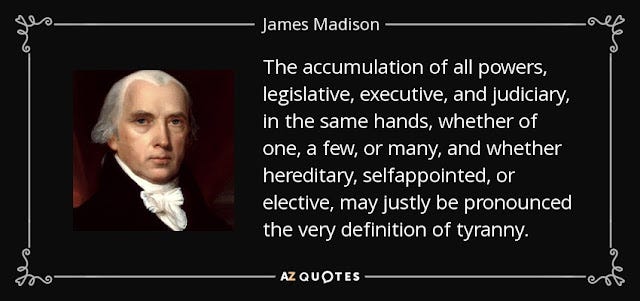Restore Power to the People
When asked the proper division of political power between the American people and their representatives in government, the author of the Declaration of Independence and third President of the United States, Thomas Jefferson, answered the following:
“What has destroyed liberty and the rights of man in every government which has ever existed under the sun? The generalising & concentrating all cares and powers into one body…And I do believe that if the Almighty has not decreed that Man shall never be free, that the secret will be found to be in the making himself the depository of the powers respecting himself, so far as he is competent to them, and delegating only what is beyond his competence by a synthetical process, to higher & higher orders of functionaries, so as to trust fewer and fewer powers, in proportion, as the trustees become more and more oligarchical.”

Jefferson recognized the self-evident truth of America’s founding, which is embodied in the U.S. Constitution, that all power to govern resides ultimately with the people, and in each person severally, insofar as he is "competent" to wield it. That is the bedrock principle of self-government. Jefferson further described that in a republican government the people, of necessity, delegate authority according to a "synthetical process, to higher & higher orders of functionaries." Those would be our local, state and federal elected office holders.
Jefferson warned, however, to trust fewer and fewer powers to office holders at higher and higher levels, "as the trustees become more and more oligarchical.” Some have termed this description of American government the "Jeffersonian democracy."
So where am I going with this?
The Constitution guarantees to the states a "republican form of government,” Article IV, Section 4. As Jefferson described, policy-making in American government should always take place at the level closest to the people, all the way down to the individual, as each level is "competent" to make it.
So here we have an existing law governing special elections, such as the one involving the election of a replacement for retired Senator Johnny Isakson. Once Isakson retired, Governor Kemp, justified by the founding principle above, is empowered by law to select a temporary replacement, who we all recognize became Kelly Loeffler. Kemp was justified in making that appointment because only he was competent to make it in a time frame ensuring the people of Georgia would never go without representation in the U.S. Senate. All that is as it should be.
But now we have a Spring primary and Fall general election approaching. The people will be going to the polls anyway. No special election would be required, no additional costs incurred to facilitate the selection of a people’s choice of senate candidate for the Fall election. Yet according to existing “jungle primary” law, whoever the Governor selects as a stand-in bypasses the primary process, his or her name automatically appearing on the November election ballot. That appointee runs no primary race, proves nothing to the people of his or her party, but is simply tapped by the governor, a needlessly undemocratic process.
Our founders understood how these decisions should be made. They crafted that principle into the US Constitution, each founder fully endorsing Article IV, Section 4. Jefferson left us an accurate description of what that means.
So the special election law in Georgia is flawed. In the case before us, Georgians do not require a “special” election for Republicans to select their own candidate for Johnny Isakson’s seat in normal due course. And heeding Jefferson's warning, we see how trusting more and more powers to trustees, such as Georgia's governor, those trustees "become more and more oligarchical.” In cases like this, jungle primary laws around the country are simply power grabs for sitting governors to supplant the will of the people.

HB757, under consideration in the Georgia House, would change all that, making Kemp's replacement, Kelly Loeffler, a pure stop-gap appointment, as she should be, and appropriately restore the power to decide statewide candidates for general elections, whenever and wherever feasible, to the people, through their normal party primary procedures. That is where that power properly belongs and has resided since the days of George Washington. Although the timing of events will not allow every vacated office to be filled in due course by the people, there is no reason the senate seat in question should not. The people are going to the primary polls anyway and would either ratify Governor Kemp’s selection, or select another individual to represent the Republican Party in November’s general election. Doing so would ensure that the names of the very strongest candidates from each party would appear on the November ballot. It is time to stop jungle primaries in Georgia whenever circumstances allow.
But restoring power to the people to select their own senate candidates in the November general election is being fought by numerous elected officials, including Governor Kemp, and very surprisingly, at least two Forsyth County representatives. They offer the following justifications: that we should not succumb to situational ethics; that this is simply a power play by Speaker Ralston; that it would be bad policy to change rules after a game starts, and mistakenly alleging that HB757 would only apply to one election. Those arguments defy America’s founding principles. It is never the wrong time to do the right thing. And the right thing is to restore political power into the hands of the people whenever circumstances allow.



